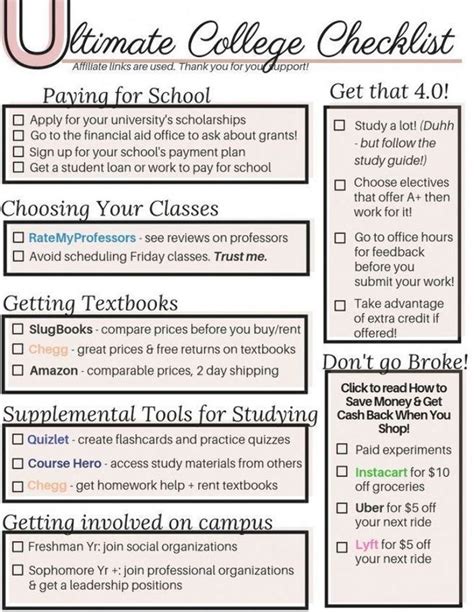As a student, time management is crucial for achieving academic success. Use this comprehensive to-do list to stay organized, prioritize tasks, and maximize your study time.

Create a Daily and Weekly Schedule
- Set Study Hours: Allocate specific time slots for studying, even on weekends.
- Break Down Tasks: Divide large assignments into smaller, manageable chunks.
- Use a Planner or Digital Calendar: Track appointments, deadlines, and tasks.
Plan Your Study Sessions
- Active Recall: Test your understanding by retrieving information from memory without looking at notes.
- Spaced Repetition: Review material at increasing intervals to enhance retention.
- Pomodoro Technique: Work for 25 minutes, then take a 5-minute break to improve focus.
Organize Your Notes
- Use a Note-Taking System: Develop a method that works for you, such as Cornell Notes or digital note apps.
- Color-Code and Tag Notes: Categorize information for easy retrieval.
- Create Concept Maps: Visualize connections between concepts and ideas.
Manage Assignments and Projects
- Set Realistic Deadlines: Break projects into smaller milestones and set target completion dates.
- Prioritize Tasks: Identify the most important assignments and prioritize them accordingly.
- Collaborate with Classmates: Form study groups or exchange notes to support each other.
Prepare for Exams
- Review Material Regularly: Consistently revisit course content throughout the semester.
- Practice Past Papers: Familiarize yourself with exam formats and question types.
- Seek Clarification: Consult with professors or TAs if you have any questions or require additional support.
Maintain Your Wellness
- Prioritize Sleep: Aim for 7-9 hours of quality sleep each night.
- Engage in Regular Exercise: Exercise releases endorphins that enhance mood and cognitive function.
- Manage Stress: Practice relaxation techniques, such as yoga or meditation, to reduce stress and improve focus.
Additional Tips for Success
- Set SMART Goals: Ensure your goals are specific, measurable, achievable, relevant, and time-bound.
- Use Technology Wisely: Utilize apps and software to organize tasks, take notes, and access resources.
- Seek Support When Needed: Don’t hesitate to ask for help from professors, tutors, or friends.
- Reward Yourself: Recognize your accomplishments to stay motivated and on track.
Tables for Efficient Planning
| Daily Schedule | Weekly Schedule | Assignment Tracker | Exam Preparation |
|---|---|---|---|
| 6 am: Wake up | Monday: Math, Science | Assignment: Essay | Review: Chapter 1 |
| 7 am: Exercise | Tuesday: English, History | Due Date: Friday | Practice: Past Paper |
| 8 am-10 am: Study Math | Wednesday: Math, Science | Priority: High | Study: Concept Map |
| 10 am-12 pm: Class | Thursday: English, History | Notes: Research | Practice: Past Paper |
| 12 pm-1 pm: Lunch | Friday: Review | Progress: 50% | Review: Key Concepts |
| 1 pm-3 pm: Study Science | Saturday: Study | Deadline: Week 10 | Practice: Multiple Choice |
| 3 pm-5 pm: Free Time | Sunday: Free Time | Collaboration: Study Group | Practice: Essay Question |
FAQs
-
What is the most important thing to consider when creating a study schedule?
Answer: Set realistic study hours and break down large tasks into smaller chunks. -
How often should I review material for exams?
Answer: Consistently revisit course content throughout the semester to enhance retention. -
What is the key to managing stress during exam preparation?
Answer: Prioritize sleep, engage in regular exercise, and practice relaxation techniques. -
How can technology be effectively used for studying?
Answer: Utilize apps and software to organize tasks, take notes, and access resources. -
What is the best way to prioritize assignments?
Answer: Identify the most important assignments based on due dates, difficulty, and potential impact on grades. -
How can I collaborate with classmates effectively?
Answer: Form study groups, exchange notes, and support each other through shared resources and discussion.
